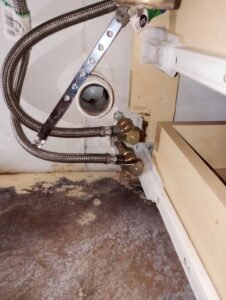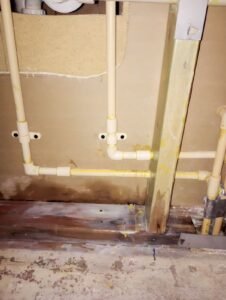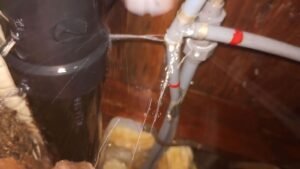What causes most water leaks in the house?
Water leaks in the home can be more than just an inconvenience; they can lead to extensive damage, costly repairs, and even health hazards. As Plumbing Therapist, we understand the importance of addressing water leaks promptly and effectively. In this comprehensive blog, we will explore the causes of water leaks, how to detect them, prevention strategies, and solutions to tackle these issues head-on. Let’s dive in!
Water leaks in our homes can be both a nuisance and a potential disaster. They can lead to structural damage, mold growth, high water bills, and even health hazards. To effectively address water leaks, it’s essential to understand their underlying causes. In this section, we’ll explore five common causes:
1. Plumbing Wear and Tear
Plumbing systems don’t last forever. Over time, the constant flow of water through pipes can cause wear and tear, leading to leaks. Here’s what you need to know:
- Aging Plumbing Systems: The age of your plumbing system plays a crucial role in its susceptibility to leaks. Pipes and fixtures can deteriorate over time, especially in older homes.
- Pipe Material Considerations: The material of your pipes matters. Some materials, like copper and PVC, are more durable and less prone to corrosion than others.
- Water Quality Impact: The quality of the water running through your pipes can affect their longevity. Hard water, which contains minerals like calcium and magnesium, can accelerate pipe corrosion.
Regular inspections and maintenance are key to addressing wear and tear. If you have an older plumbing system, consider consulting a professional plumber to assess its condition.
2. Corrosion and Rust
Corrosion is a common enemy of plumbing systems. It can weaken pipes, leading to leaks or even pipe bursts. Here’s a closer look:
- Understanding Pipe Corrosion: Corrosion is a chemical reaction between water and metal pipes. It can manifest as rust or pitting on pipe surfaces, compromising their integrity.
- Factors Contributing to Corrosion: Several factors contribute to corrosion, including water pH, the presence of oxygen in the water, and the type of pipe material.
- Prevention and Maintenance: To prevent corrosion, consider using corrosion-resistant coatings on pipes and fittings. Regular plumbing maintenance can help identify and address corrosion early.
3. High Water Pressure
Excessive water pressure can wreak havoc on your plumbing system. While high water pressure might seem like a good thing, it can lead to leaks and other problems:
- Impact of Excessive Water Pressure: High water pressure can strain your pipes, joints, and fixtures. This increased stress can result in leaks, noisy pipes, and water hammer (a loud banging sound in pipes).
- Monitoring and Regulating Water Pressure: Install a pressure gauge to monitor your home’s water pressure. If it’s consistently too high, consider adding a pressure-reducing valve (PRV) to maintain safe levels.
4. Clogged Pipes
Clogs are more than just a blockage. They can increase pressure within your plumbing system and potentially lead to leaks. Consider these points:
- Causes of Pipe Clogs: Common causes of clogs include mineral deposits, grease buildup, and foreign objects flushed down drains.
- Preventing Clogs: Preventative measures include proper disposal practices, using drain screens, and scheduling regular drain cleaning.
5. Tree Root Intrusions
Nature can also pose a threat to your plumbing. Tree roots, in particular, can infiltrate underground pipes and create havoc:
- How Tree Roots Affect Pipes: Tree roots are attracted to the moisture within pipes. As they grow, they can infiltrate pipes, leading to blockages and damage.
- Preventing and Addressing Root Intrusions: Prevent root intrusions through proper landscaping practices and installing root barriers. If roots have already invaded your pipes, consult a professional for removal and pipe repair.

Consequences of water leaks in the house
Water leaks in the house can have significant consequences, ranging from minor inconveniences to severe damage and health risks. Here are the key consequences of water leaks:
- Structural Damage: Prolonged water exposure can weaken the structural integrity of your home. It may lead to rotting wood, deteriorating drywall, and compromised foundations. In severe cases, structural repairs may be necessary.
- Mold and Mildew Growth: Moisture from leaks creates an ideal environment for mold and mildew to thrive. Mold can spread rapidly, affecting indoor air quality and posing health risks, particularly for those with allergies or respiratory issues.
- Health Hazards: Mold, mildew, and damp conditions caused by leaks can contribute to a range of health problems, including respiratory issues, allergies, skin irritation, and eye irritation.
- Increased Water Bills: Leaks result in wasted water, leading to higher water bills. Ignoring leaks can lead to unnecessarily inflated monthly expenses.
- Electrical Issues: Water leaks can damage electrical systems, creating the risk of electrical fires or electrocution. It’s essential to address leaks near electrical components promptly.
- Damage to Personal Belongings: Water leaks can damage furniture, electronics, personal belongings, and sentimental items, leading to financial losses and emotional distress.
- Environmental Impact: Wasted water from leaks contributes to water scarcity and increased water treatment costs. It also places additional stress on local water resources.
- Increased Insurance Premiums: Neglecting water leaks may result in higher homeowner’s insurance premiums or even the denial of claims if the damage could have been prevented with timely action.
- Insect and Pest Infestations: Damp areas resulting from leaks can attract insects and pests, potentially leading to infestations that require pest control measures.
- Foul Odors: Stagnant water and mold growth can produce unpleasant odors throughout your home, affecting your comfort and well-being.
- Aesthetic Damage: Water stains on walls, ceilings, and floors can be unsightly and reduce the aesthetic appeal of your home.
- Loss of Property Value: If water damage is extensive and not properly addressed, it can reduce the resale value of your home.
How can I Detect Water Leaks Early?
Detecting water leaks early is crucial to prevent extensive damage and costly repairs. Here are several methods and strategies to help you identify water leaks in your home at an early stage:
Monitor Your Water Meter:
- One of the simplest ways to detect water leaks is by monitoring your water meter. To do this:
- Ensure that no water is being used in your home (no faucets running, appliances using water or toilets flushing).
- Take note of the current reading on your water meter.
- Wait for a few hours (preferably when everyone is away from home) and then recheck the meter.
- If the meter reading has changed, it indicates water usage when none should have occurred, suggesting a potential leak.
Check Your Water Bill:
- Review your water bills regularly. A sudden and unexplained increase in your water bill can be a sign of a hidden water leak.
Listen for Unusual Sounds:
- Sometimes, you can hear water leaks. Listen for dripping or running water sounds in areas where there shouldn’t be any, such as inside walls, ceilings, or under sinks.
Visual Inspection:
- Conduct a visual inspection of your home for signs of water leaks, including:
- Water stains or discoloration on walls, ceilings, or floors.
- Mold or mildew growth, which often thrives in damp environments.
- Damp or musty odors in specific areas of your home.
- Bulging or sagging walls or ceilings can be indicative of hidden water damage.
Use Leak Detection Devices:
- Invest in leak detection devices, such as water leak detectors or moisture sensors. These devices can alert you to the presence of moisture or leaks in specific areas.
Check Faucets, Toilets, and Appliances:
- Inspect faucets, toilets, and appliances for any visible leaks or drips. Even a slow and steady drip can waste a significant amount of water over time.
Examine Your Water Heater:
- Water heaters can develop leaks over time. Check around your water heater for signs of moisture or rust.
Inspect Outdoor Areas:
- Don’t forget to inspect outdoor areas as well. Check for wet spots in your yard when it hasn’t rained recently, as this can indicate an underground pipe leak.
Pressure Testing:
- Conduct a pressure test on your plumbing system. Shut off all water sources in your home, then attach a pressure gauge to a hose bib or faucet. If the pressure drops over time, it could be a sign of a leak.
Professional Leak Detection Services:
- If you suspect a hidden or underground leak but can’t pinpoint its location, consider hiring a professional leak detection service. They use specialized equipment like acoustic sensors and infrared cameras to locate leaks accurately.
Regularly checking for water leaks and acting promptly if you detect one can save you money, prevent water damage, and preserve precious resources. Early detection is key to addressing water leaks before they become more significant problems.

Prevention Is Key: Protecting Your Home from Water Leaks
Water leaks can cause extensive damage to your home and lead to costly repairs. Fortunately, taking preventive measures can significantly reduce the risk of leaks. In this section, we’ll explore key strategies for preventing water leaks: regular plumbing maintenance, proper insulation, and solutions for water leak repair.
Regular Plumbing Maintenance:
Regular maintenance is the cornerstone of leak prevention. Here’s how it plays a crucial role in protecting your home:
- Scheduled Inspections: Arrange for periodic plumbing inspections by a professional plumber. They can identify potential issues before they escalate into major leaks.
- Pipe Integrity: Plumbers can assess the condition of your pipes, identifying any signs of corrosion, wear, or damage. Early detection allows for timely repairs or replacements.
- Fixture Checks: Plumbing fixtures like faucets, toilets, and showerheads can develop leaks over time. A plumber can inspect and repair or replace faulty fixtures as needed.
- Appliance Maintenance: Ensure that appliances connected to your plumbing, such as water heaters, dishwashers, and washing machines, receive regular maintenance to prevent leaks.
- Sealing Joints: Plumbing joints and connections should be properly sealed to prevent leaks. Plumbers can inspect and reseal joints when necessary.
Proper Insulation:
Insulation is a critical factor in leak prevention, particularly in colder climates where freezing pipes are a concern. Consider these insulation-related strategies:
- Pipe Insulation: Insulate exposed pipes, especially in unheated areas like basements, attics, and crawlspaces. This prevents pipes from freezing and bursting during cold weather.
- Attic and Wall Insulation: Adequate insulation in your attic and walls can help maintain consistent indoor temperatures. This minimizes the risk of condensation forming on pipes and causing leaks.
- Exterior Protection: Seal any gaps or cracks in your home’s exterior to prevent cold air from infiltrating and potentially freezing pipes.

Solutions for Water Leaks
Water leaks, whether big or small, can wreak havoc on your home. They not only waste precious resources but can also cause structural damage and mold growth if left unchecked. Fortunately, there are various solutions for water leak repair, each tailored to the severity and nature of the leak.
DIY Fixes for Minor Leaks:
For small, manageable leaks, a DIY approach can be effective and cost-efficient. Some common DIY fixes include tightening loose connections, replacing worn-out washers, or using epoxy putty to seal minor cracks or holes in pipes. It’s essential to turn off the water supply to the affected area before attempting any repairs. DIY solutions are best suited for minor drips and leaks that you can identify and access easily.
Hiring a Professional Plumber:
When dealing with more complex leaks or those hidden within walls, floors, or ceilings, it’s often wise to enlist the expertise of a professional plumber. Plumbers have the knowledge and specialized equipment, such as leak detection tools and video inspection cameras, to accurately diagnose the source and extent of the leak. They can then perform precise repairs to ensure a lasting solution. Professional plumbers also adhere to local plumbing codes, ensuring the work is done safely and compliantly.
Re-piping as a Long-term Solution:
In older homes with a history of recurrent leaks or outdated plumbing systems, re-piping may be the best long-term solution. Re-piping involves replacing old, deteriorating pipes with new, durable ones made of materials like copper or PEX. This not only eliminates existing leaks but also prevents future issues. While re-piping is a more extensive and costly endeavor, it can provide peace of mind and protect your home from the risk of ongoing leaks and water damage.
Water Damage Restoration:
After a water leak, even once it’s repaired, there may be residual damage to your home. Water damage restoration professionals specialize in assessing and mitigating the effects of water intrusion. They’ll assess the extent of damage, remove excess moisture, and repair or replace damaged materials. This crucial step helps prevent mold growth, structural issues, and further deterioration.
The solution for water leak repair depends on the nature and severity of the leak. For minor drips, DIY fixes can suffice. However, complex or hidden leaks necessitate the expertise of a professional plumber. In cases of recurrent leaks or aging plumbing systems, re-piping offers a lasting solution. Lastly, water damage restoration is essential to mitigate the aftermath of leaks and ensure your home remains safe and structurally sound. Regardless of the approach, taking swift and appropriate action is vital to protect your home and prevent further damage.
The Importance of Timely Action When Dealing with Water Leaks
Water leaks in your home can seem like minor inconveniences at first, but they have the potential to escalate into major problems if not addressed promptly. Taking timely action is crucial to mitigate damage, minimize repair costs, and protect your home and health. In this section, we’ll delve into the importance of acting quickly when dealing with water leaks.
1. Financial Impact of Neglect:
Ignoring a water leak can have a substantial financial impact in several ways:
- Escalating Repair Costs: What may start as a small, manageable leak can worsen over time. As the leak continues, it can damage structural elements, electrical systems, and personal belongings, leading to more extensive and costly repairs.
- Increased Water Bills: Leaks result in wasted water, causing a spike in your water bills. Ignoring a leak means you’re essentially paying for water that isn’t benefiting you, leading to unnecessary expenses.
- Insurance Implications: Delaying repairs can affect your homeowner’s insurance. Many policies require you to take reasonable steps to prevent further damage. Failure to do so may result in your insurance company denying a claim for the damage.
2. Health Risks:
Water leaks can create an ideal environment for mold and mildew growth. Mold spores can be harmful to your health, particularly if you have respiratory issues or allergies. Here’s how timely action mitigates health risks:
- Mold Prevention: Addressing leaks promptly prevents moisture buildup, reducing the risk of mold and mildew growth. Mold remediation can be costly and may require temporary relocation while your home is treated.
- Indoor Air Quality: Mold can degrade indoor air quality, leading to respiratory problems, allergies, and other health issues. By addressing leaks promptly, you protect the health and well-being of your household.
3. Environmental Consequences:
Neglecting water leaks also has environmental consequences:
- Water Wastage: Every drop of water that leaks unnecessarily contributes to water wastage. Conserving water is not only responsible but also helps reduce your water bills.
- Resource Impact: The materials used in home repairs, such as drywall and insulation, have environmental footprints. By avoiding extensive repairs through timely action, you help reduce the demand for these resources.
4. Structural Damage Prevention:
Water leaks can damage the structural integrity of your home. Timely action is crucial to:
- Preserve Structural Elements: Wood and other building materials can weaken and rot when exposed to water over time. Addressing leaks prevents further deterioration of structural components like beams and joists.
- Avoid Costly Replacements: Delayed action may necessitate replacing damaged structural elements, a considerably more expensive and time-consuming process than making timely repairs.
Protecting Your Home from Water Leaks: Plumbing Therapist’s Expert Conclusion
In conclusion, water leaks are more than just an inconvenience; they are potential disasters waiting to happen in our homes. As Plumbing Therapist, we understand the urgency of addressing water leaks promptly and effectively.
From understanding the causes of water leaks, such as wear and tear, corrosion, high water pressure, clogged pipes, and tree root intrusions, to detecting them early through vigilant monitoring and professional services, prevention is indeed key.
We’ve discussed the importance of taking timely action when dealing with water leaks. Neglecting them can lead to financial strain, health risks, and environmental consequences.
Furthermore, we explored various solutions for water leak repair, from DIY fixes for minor leaks to the long-term promise of re-piping and the essential role of water damage restoration.
In your journey to safeguard your home from water leaks, Plumbing Therapist is here to support you with professional expertise, timely services, and a commitment to ensuring that your home remains leak-free and your peace of mind intact. Remember, a proactive approach to water leaks can save you money, protect your health, and preserve your property.

